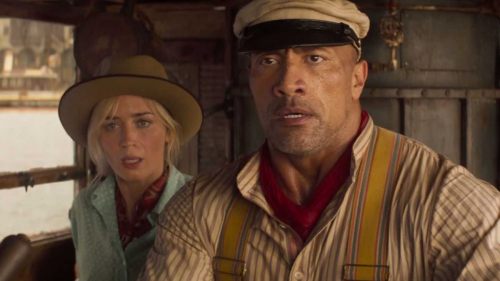Sundance Review: THE BIG SICK
Why rack your brain trying to conceive the next great romantic comedy when you’ve actually lived it? That’s the bold approach adopted by Kumail Nanjiani and Emily V. Gordon, who’ve mined their eventful courtship to hilarious and, at times, heartbreaking effect with The Big Sick. Produced by Judd Apatow and Barry Mendel, the film works within the former’s character-driven formula, ambling along as it introduces us to its immensely likable main characters and the friends/family/assorted goofballs that make their lives rich and miserable. But it’s Nanjiani’s Pakistani heritage, and the religious traditions to which his parents insist he adhere, that sets The Big Sick apart from other Apatow-produced efforts. What a difference a different cultural perspective makes!
Following the illustrious lead of Muhammad Ali, Jackie Robinson and Howard Stern, Nanjiani has chosen to cast himself in the story of his life, and exhibits not an ounce of awkwardness or self-consciousness in the role. Gordon, on the other hand, has stepped aside to allow the dependably great Zoe Kazan relive the highs and nearly-fatal lows of her incipient romance with Nanjiani. The film opens in meet-cute fashion as Kumail playfully accuses Kazan’s Emily of heckling him during his just-finished stand-up set. He’s not really mad and she doesn’t take real offense because they both know where this is going; after a bullshit attempt to watch a movie (that reliable mood-setter Night of the Living Dead) back at Kumail’s crib, the two get right after it. Post-coitus, Emily aims to beat a hasty retreat. Though Kumail begs her to stay the night, Emily waves him off and calls an Uber, unaware that she just had sex with the nearest driver.
Kumail’s Uber side gig is primarily what pays the rent while he pursues his career as a stand-up comic. It’s not the lawyering life his immigrant parents (Anupam Kher and Zenobia Shroff) imagined for their son when they left Pakistan, but their main focus for the time being is on getting him married off to a nice Pakistani girl. Indeed, the obligatory moment of every family dinner is a visit from a young single woman who “just happened” to be in the neighborhood. Kumail observes the tradition by placing photographs of all the rejected candidates – all of whom know The X-Files is the way to his heart – in a box.
Though he knows his parents would never approve, Kumail continues to see Emily. She remains reluctant, and we soon learn why: she married young, and is leery of rushing into anything serious. Kumail is surprised, but not spooked; he’s falling hard for Emily, and lets her know he isn’t going anywhere. What he doesn’t tell Emily, however, is that his parents are completely unaware of her, and if they were to find out they would demand an end to their relationship. Kumail’s secrecy blows up on him when Emily discovers his box of would-be wives; she feels betrayed, and promptly does his parents’ work for them. It’s over.
And yet when Emily is admitted to the emergency room with a mysterious illness, Kumail is the only person in the city who knows her well enough to check in on her. Emily’s not thrilled to see him, but she’s also really sick; within hours, the doctors have determined that they need to place her in an induced coma, which can only be accomplished if Kumail approves. As her husband. Understanding the direness of the situation, he complies.
It’s the kind of soap-opera absurd twist that only real life can throw at you, and it guides the movie into a magnificent second act where Kumail gradually earns the trust and love of Emily’s parents. Aside from a disastrously wrongheaded question about Kumail’s thoughts on 9/11, there isn’t much of a culture clash. Beth (Holly Hunter) and Terry (Ray Romano) are good people who are understandably protective of their critically-ill daughter, and they’re not sure the guy who recently broke her heart deserves a place at her bedside. Romano’s Terry is an aloof, slightly henpecked husband, but who wouldn’t be intimidated the mama-bear whirling dervish that is Beth? Hunter summons up the spitfire defiance of Raising Arizona’s Edwina “Ed” McDunnough and Broadcast News’ Jane Craig, but cuts it with a volatile mixture of helplessness and spite. Like any mother, she hates not being able to do more for her sick child; Terry absorbs most of her fury (he’s used to it, and, we find out later, feels like he deserves it), but others get strafed as well (a racist heckler at one of Kumail’s shows nearly catches a beatdown). This indignation masks Beth’s deep reserves of warmth and kindness; once she decides Kumail is on the level, she treats him as if he’s one of the family. It’s not hyperbole to suggest this performance ranks among Hunter’s very best.
The performances are uniformly excellent in The Big Sick, which is something that’s become a trend in Michael Showalter films. From The Baxter (a criminally underseen treasure) to Hello, My Name Is Doris, Showalter has established himself as a true actor’s director. He may not wow with his mise en scene, but his movies don’t call for bravura visual technique. There’s a freedom and ease in the performances here that you only get when actors feel secure. For a film this intensely personal, it’s surprising how collaborative it all feels.
Once Emily emerges from her coma (spoiler alert: the woman who co-wrote the screenplay survives), the movie begins to lurch from scene to scene in search of resolution. To Nanjiani and Gordon’s credit, they don’t want to make it easy on their characters. After a lifetime of steadfast belief in the concept of arranged marriage, Kumail’s parents aren’t just going to relent after one heartfelt confrontation. And even though his all-consuming devotion to Emily caused him to blow a major stand-up opportunity, Kumail still has to prove he’s worthy of non-comatose forgiveness. But if the final act isn’t as strong as the first two, we’re still thrilled to be in the company of these flawed, but decent human beings. Compassion is in such short supply these days, it’s a blessing to find a film with an overabundance of it.



